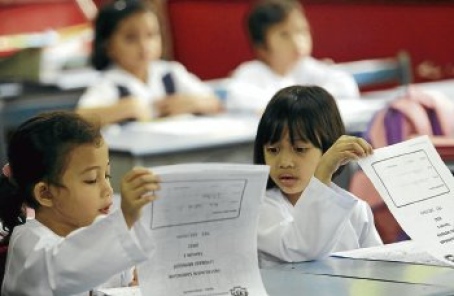Avoid political traps in the pursuit of ‘free education’
Professor Tan Sri Dato' Dzulkifli Abdul Razak
Learning Curve: Perspective
New Sunday Times - 01-08-2012
The premise of a welfare state no longer holds water in respect of ‘free education’
SOME 500,000 Year One pupils will benefit from “free” education with the start of the new year.

Education must not be made to suffer from any ideological debates thatdistract it from bringing the greatest benefit to the Malaysian population.
The recently announced “free education policy”, which covers some 5.3 million students in primary and secondary government schools, is a first in the education history of Malaysia.
This initiative is part of the 2012 budget revealed in the Dewan Rakyat last October with the aim of ensuring that all Malaysian students will have access to quality and affordable education.
Given that basic schooling is one of the major aspects of the Millennium Development Goals, targeted to be achieved by 2015, the “free education policy” is timely to ensure equity.
Prior to this, students were required to fork out RM24.50 and RM33.50 respectively which included payment for co-curriculum activities, internal test papers, Malaysian Schools Sports Council fees and insurance premium.
Another worthy exercise is to revert to the original purpose of residential schools, which is to make quality education available to the poor in the effort to promote socio-economic equity.
The issue is not about schools per se, but more of narrowing the socio-economic gap that seems to be an obstacle to underprivileged pupils even as we approach the 55th anniversary of our independence.
If we cannot use education to level the playing field for the generations to come, it would be more difficult to do so by other means.
At the same time, it has been noted that parents from a more affluent background are collectively able to turn around a school. Schools attended by those from higher income families tend to do better.
The initiatives must not be confused with the political notion of creating a “welfare” state.
While it is true that the term implies that “the state plays a key role in the protection and promotion of the economic and social well-being of its citizens” based on the principles of equality of opportunity, equitable distribution of wealth and public responsibility for those unable to avail themselves of the minimal provisions for a good life, education is only one of the many services involved.
Education — one of the most important public good, apart from health — must not be made to suffer from ideological debates that distract it from bringing the greatest benefit to the Malaysian population in shaping up a more egalitarian and peaceful future.
Nordic countries such as Sweden, Norway, Denmark and Finland are often cited as successful examples of modern welfare states where education is free in schools and universities.
The general working model is where there is a direct transfer of funds from the state to the services provided (i.e. education, healthcare) as well as directly to individuals. There is little resemblance of private-for-profit education as such.
More interestingly, the Nordic model of education seems to fare much better comparatively across the board.
For example, Toril Johansson of the Ministry of Education and Research of Norway has been cited as saying that the principle of free education is provided for in Norwegian law, and it is the responsibility of the country’s politicians to make sure that education remains free of charge.
Internationalisation is recognised as important, but “with a complete budget of 20 billion krone (RM10.6 billion), we count on the sector to be able to handle the students in a good way, also without the extra income a tuition fee might provide”.
This, however, may not be the case for much longer despite Norway being a welfare state.
Bjørn Stensaker, researcher for the Norwegian Institute for Studies in Innovation, Research and Education, seems to suggest that there are now strong forces indicating that tuition fees will be introduced sooner or later, beginning at the tertiary level.
The trend in the rest of Europe is towards charging fees or further hiking them, especially as a wave of conservative governments rule over the continent.
In Sweden and Denmark, fees are imposed on international non-European students.
And this is just the beginning as many fear. In other words, the premise of a welfare state no longer holds water when it comes to “free education”.
We must be aware of such potential political traps if we are serious in trying to make “free education” the main driver of the dream of an equitable Malaysia of the future.
- The writer is vice chancellor of the Albukhary International University
